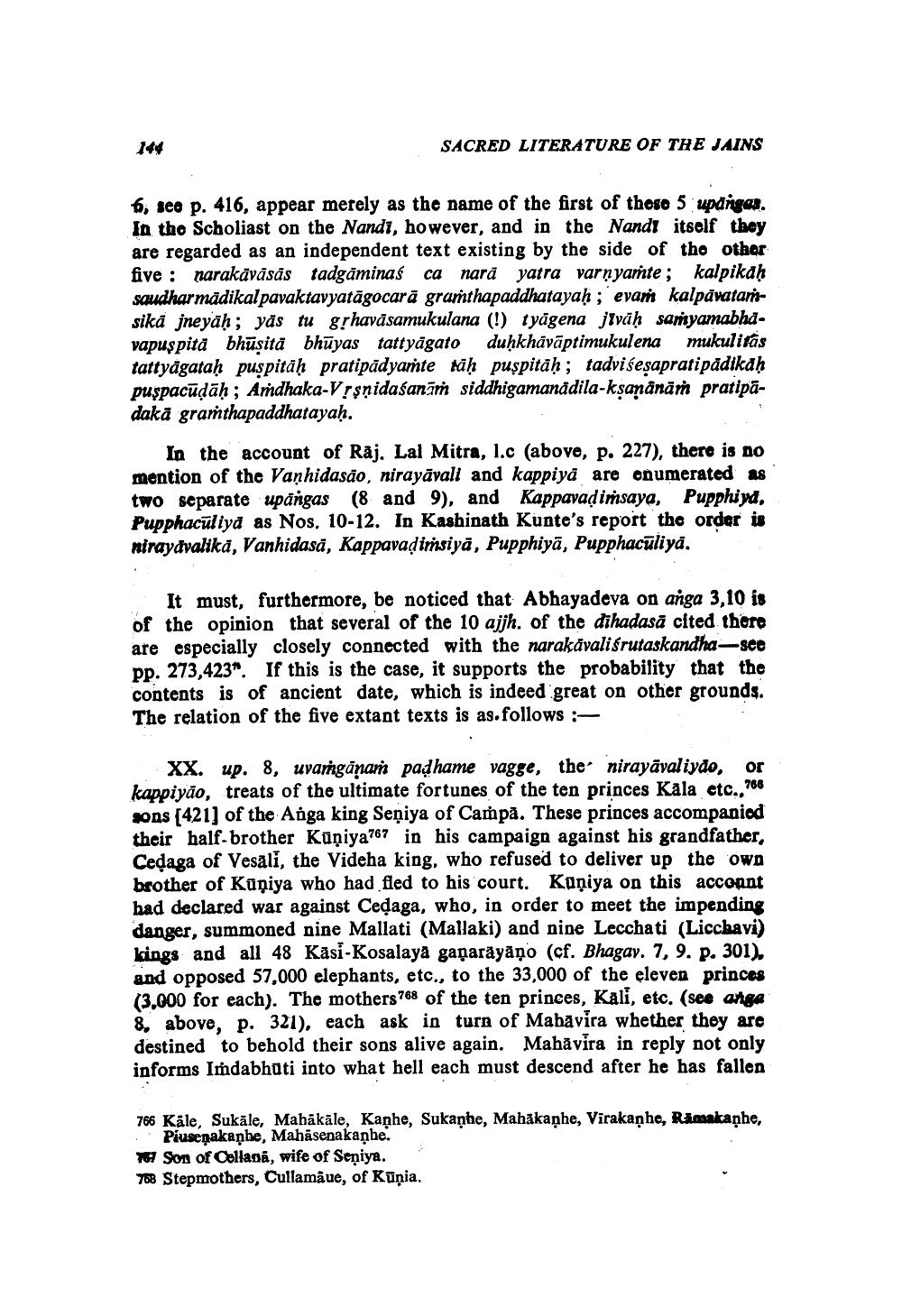________________
144
SACRED LITERATURE OF THE JAINS
6, seo p. 416, appear merely as the name of the first of thoso 5 upangas. In tho Scholiast on the Nandi, however, and in the Nandı itself they are regarded as an independent text existing by the side of the other five : narakāvāsas tadgaminas ca nará yatra varnyaṁte; kalpikah saudharmadikalpavaktavyatāgocarā graṁthapaddhatayaḥ; evar kalpāvatarisika jneyāḥ; yas tu grhavāsamukulana (!) tyāgena jivāḥ samyamabhdvapuspita bhūsitä bhūyas tattyägato duḥkhāvāptimukulena mukulitas tattyägataḥ puspitaḥ pratipădyarte tāḥ puspitāḥ; tadviśesapratipädikaḥ puspacūļāḥ; Arndhaka-Vrsņidaśanāṁ siddhigamanadila-ksanänāṁ pratipādakā graṁthapaddhatayaḥ.
In the account of Raj. Lal Mitra, 1.c (above, p. 227), there is no mention of the Vanhidasão, nirayāvali and kappiyå are enumerated as two separate upangas (8 and 9), and Kappavadimsaya, Pupphiya, Pupphacūliyd as Nos. 10-12. In Kashinath Kunte's report the order is nirayávalika, Vanhidasä, Kappavadirsiyā, Pupphiyā, Pupphacūliya.
It must, furthermore, be noticed that Abhayadeva on anga 3,10 is of the opinion that several of the 10 ajjh. of the dihadasă cited there are especially closely connected with the narakavali frutaskandha-SCO pp. 273,423". If this is the case, it supports the probability that the contents is of ancient date, which is indeed great on other grounds. The relation of the five extant texts is as.follows :
XX. up. 8, uvaringānam padhame vagge, the nirayāvaliydo, or kappiyão, treats of the ultimate fortunes of the ten princes Kala etc.,706 tons (421) of the Anga king Seņiya of Campa. These princes accompaniod their half-brother Kūņiya767 in his campaign against his grandfather, Cedaga of Vesali, the Videha king, who refused to deliver up the own brother of Kūņiya who had fled to his court. Kuņiya on this account had declared war against Cedaga, who, in order to meet the impending danger, summoned nine Mallati (Mallaki) and nine Lecchati (Licchavi) kings and all 48 Käsi-Kosalaya gaparāyāņo (cf. Bhagay. 7, 9. p. 301), and opposed 57,000 elephants, etc., to the 33,000 of the eleven princes (3.000 for each). The mothers 768 of the ten princes, Kali, etc. (see anga 8. above, p. 321), each ask in turn of Mahavira whether they are destined to behold their sons alive again. Mahāvira in reply not only informs Imdabhati into what hell each must descend after he has fallen
766 Käle, Sukāle, Mahakāle, Kaņhe, Sukaņhe, Mahākaņhe, Virakaṇhe, Rämakanhe, · Piuseņakanhe, Mahasenakaṇhe.
Son of Collana, wife of Seņiya. 76B Stepmothers, Cullamäue, of Kūņia,




